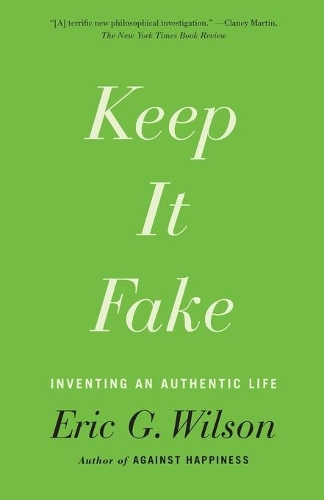
Keep It Fake
Publishing Details
Keep It Fake
By (Author) Eric G. Wilson
By (author) Eric Wilson
Sarah Crichton Books
Sarah Crichton Books
10th May 2016
United States
Classifications
General
Non Fiction
Ethics and moral philosophy
Popular culture
Literary studies: general
177.3
Physical Properties
240
Width 129mm, Height 195mm, Spine 12mm
262g
Description
We love these commands, especially in America, because they invoke what we love to believe: that there is an authentic self to which we can be true. But while we mock Tricky Dick and Slick Willie, we're inventing identities on Facebook, paying thousands for plastic surgeries, and tuning in to news that simply verifies our opinions. This is frontier forthrightness gone dreamy: reality bites, after all, and faith-based initiatives trump reality-based ones, and becoming disillusioned is a downer. In Keep It Fake: Inventing an Authentic Life, Eric G. Wilson investigates this phenomenon. He draws on neuroscience, psychology, sociology, philosophy, art, film, literature, and his own life to explore the possibility that there's no such thing as unwavering reality. Whether our left brains are shaping the raw data of our right into fabulous stories or we're so saturated by society's conventions that we're always acting out prefab scripts, we can't help but be phony. But are some fakes more real than others Are certain lies true In lively prose - honest, provocative, erudite, witty, wide-ranging (as likely to riff on Bill Murray as to contemplate Plato) - Keep It Fake answers these questions, uncovering bracing truths about what it means to be human and helping us turn our necessary lying into artful living.
Reviews
Praise for "Everyone Loves a Good Train Wreck"
A leisurely, light-footed overview of our cultural obsession with doom, gloom, and gore.--Josh Rothman "The Boston Globe "
Praise for "Keep it Fake""A gifted, candid raconteur, [Wilson] serves up pithy and often playful writing... Readers should be left entertained and enlightened by Wilson's vast knowledge, immediacy, and honesty." --"Publishers Weekly"Praise for "Everyone Loves a Good Train Wreck"
"A leisurely, light-footed overview of our cultural obsession with doom, gloom, and gore." --Josh Rothman, "The Boston Globe"Praise for "Against Happiness""Mr. Wilson's case for the dark night of the soul brings a much needed corrective to today's mania for cheerfulness. One would almost say that, in its eloquent contrarianism and earnest search for meaning, "Against Happiness" lifts the spirits." -- Colin McGinn, "The Wall Street Journal""An impassioned, compelling, dare I say poetic, argument on behalf of those who 'labor in the fields of sadness'. . ." --"Minneapolis Star Tribune"
Author Bio
Eric G. Wilson is the Thomas H. Pritchard Professor of English at Wake Forest University in Winston-Salem, North Carolina. He is the author of Everyone Loves a Good Train Wreck: Why We Can't Look Away, Against Happiness: In Praise of Melancholy, The Mercy of Eternity: A Memoir of Depression and Grace, and five books on the relationship between literature and psychology.
